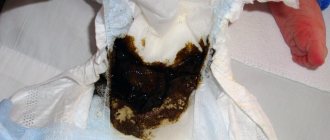Why is this happening?
According to nutritionists, kefir and other fermented milk products are very beneficial for the gastrointestinal tract. Due to the content of lactobacilli, they suppress the growth of pathogens in the intestines that cause increased gas formation and flatulence.
But for some people, fermented milk products cause bloating and abdominal pain. This happens for the following reasons:
- Lactic acid irritates the gastrointestinal mucosa and causes bloating.
- Lactobacilli, which are contained in kefir, can cause unwanted reactions and flatulence in the gastrointestinal tract.
- Wrong food combinations. Dairy products should not be mixed with other foods, with the exception of fruits and cereals. But they should be eaten only in small quantities and if this does not cause discomfort. The combination of kefir with baked goods is completely excluded, since it provokes increased gas formation and a feeling of bloating in the intestinal area.
- The fermentation product (sourdough) used in the production of fermented milk products sometimes causes increased gas formation, as well as flatulence.
- One of the causes of flatulence may be lactose intolerance, which is part of fermented milk products. In such a case, you can use mature kefir, that is, one that has a three-day period from the date of production. This almost completely eliminates lactose.
- The individual sensitivity of the body to lactic acid products is also of great importance.
The occurrence of bloating from kefir is quite possible, although it occurs mainly due to intolerance to this product. However, even in this case, nutritionists do not recommend completely eliminating kefir, which causes flatulence, from the diet, since it is important for the digestion process.
Exercises to eliminate bloating
Physical exercise has a good effect on flatulence. They promote the passage of gases and stimulate intestinal motility. They can be used during bloating and to prevent this condition. The most effective of them are static exercises and massage:
- Fetal position. Pull your legs bent at the knees towards your stomach and clasp them with your arms. Fix the body in this position for a couple of minutes. Repeat about 10 times.
- Press tension. Alternately tense and relax your abdominal muscles. In this case, you should hold your breath for 15 seconds.
- Self-massage. Apply circular strokes with your fingers to the area around the navel. Be sure to go clockwise, with a little pressure.
- Physical impact goes well with the use of medicinal teas. Regular repetition of exercises helps prevent bloating.
Treatment of bloating from kefir
Since this condition is not uncommon, ways to combat this unpleasant phenomenon have long been found. Everyone chooses the best option for themselves, but the integrated use of methods significantly speeds up the solution to the problem.
Nutrition correction
In case of occasional cases of flatulence, it is enough to avoid foods that provoke fermentation and gas formation. These include:
- bread;
- apples;
- legumes;
- grape;
- smoked meats;
- beer and wine;
- dried fruits;
- fatty meats;
- confectionery.
During the period of especially active gas formation, it is recommended to eat boiled or stewed vegetables (carrots, beets), porridges cooked in water, lean meat and fish. You should eat 4-6 times a day, while simultaneously drinking a sufficient amount of still water. You can also drink kefir, if you do not combine it with other products.
Bloating exercises
Sometimes it’s quite simple to activate your intestines - you just need to move more. But you don’t have to sign up for a gym to do this. It is enough to do simple exercises. For example:
- exercise “bicycle” (flexion and extension of legs bent at the knees in a lying position);
- rocking on a ball (lying on your stomach);
- yoga classes.
A light self-massage of the abdomen will also not hurt. To do this you need:
- take a “lying on your back” position;
- place a cushion under your neck and bend your legs at the knees;
- warm up your hands a little and place them on your stomach;
- Next, you need to stroke it clockwise, pressing slightly on the navel area;
- do the same movements on the sides.
Medications
The choice of medications to eliminate bloating will directly depend on the cause of gas formation. Several groups of funds are used.
Sorbents
Indicated for intoxication of the body, which is indicated by gases with an unpleasant odor and the presence of nausea. Activated carbon, Atoxil and Enterosgel are often used.
Medications
Enterosorbents allow you to quickly overcome intestinal bloating. These pharmacological agents adsorb and remove gases and toxins from the gastrointestinal tract. Their main disadvantage is that, together with gases, enterosorbents promote the excretion of minerals and vitamins. The most popular sorbents are Enterosgel, activated carbon, Smecta, Atoxil.
The next group of medications that can improve the patient’s well-being with bloating are antifoams. Their action is based on the destruction of gas bubbles, and this leads to its absorption and free exit from the intestine. Simethicone, which is part of the drugs Maalox plus and Espumisan, is one of the most popular defoamers.
Abdominal bloating appears when there is a disruption in the functioning of the gastrointestinal tract, adhesions, as well as due to a diet containing large amounts of sweets, fresh fruits and vegetables, legumes, whole cow's milk and carbonated drinks. In this case, discomfort occurs after eating.
According to doctors, bloating in most cases develops when intestinal motor function is impaired, for example, with IBS. In this syndrome, swelling occurs due to increased sensitivity of intestinal receptors.
In addition, any disease in which the movement of masses through the intestines is disrupted, for example, colon cancer or Crohn's disease, can be accompanied by bloating. Finally, even excessive consumption of fatty foods can cause bloating, even without increased gas formation. This is due to a deterioration in the transport of food from the stomach to the intestines.
In addition, bloating can have serious causes, such as intestinal obstruction, hernia, helminthic infestation, and liver disease. Therefore, if the problem becomes protracted and is accompanied by severe pain, you should contact a gastroenterologist to identify and eliminate the true cause of the pathological phenomenon.
Fermented milk products are included in the diet of people suffering from gastrointestinal pathologies. Such nutrition has a beneficial effect on the condition of the digestive organs. Patients wonder whether it is possible to drink kefir if their stomach hurts. After all, the product contains more acid than all other dairy products.
Will this drink help with stomach pain?
Kefir will help with stomach pain, but only if gastritis is associated with low acidity. In case of increased acidity, consumption of the product is prohibited: this provokes additional irritation of the walls of the digestive organ. In addition to increased pain, patients may experience nausea and heartburn. Taking kefir is also prohibited for erosive forms of the disease and aphthous gastritis.
If acidity levels are low, consuming fermented milk products is not prohibited. Doctors recommend drinking it before bed and in the morning. The main rule is not to consume the drink immediately after a meal, as this promotes stagnation and fermentation of food in the intestines.
For chronic forms of pathology, kefir is recommended to be included in the daily menu. If there is no exacerbation, you can add pieces of fresh berries and fruits to it.
Mechanism and causes of excess gas formation
A person who has nothing to do with medicine often believes that he is bloated only because he “ate something wrong.” Yes, foods play an important role in the process of gas formation, but they are not the only provocateur of flatulence.
Thus, in children under one year of age, “gas” often accumulates, which then causes colic. The reason is a deficiency of enzymes in the gastrointestinal tract. There are also many factors that can cause excessive gas formation in the intestines of an adult.
Diseases
The intestines may become swollen due to problems with the release of gases caused by various pathologies.
Intestinal obstruction
This phenomenon can be encountered with volvulus, neoplasms in the peritoneum. Obstruction is also provoked by the entry of a bulky foreign body or by spasm.
Dysbacteriosis
Appears when bacteria that contribute to the digestion of food in the intestines die. This often occurs due to poisoning or long-term use of antibiotics.
Pathologies of the pancreas
Enzyme deficiency causes a slowdown in the digestion process. Because of this, food rots in the intestines, releasing significant amounts of gas.
Eating habits
There are products that provoke excessive gas formation:
- fruits, especially apples;
- any varieties of cabbage;
- mutton;
- legumes
Sometimes flatulence occurs due to a congenital lack of digestive enzymes. Active gas formation is possible when consuming foods with gluten (for example, wheat) or dairy products. Indigestibility of milk is often observed in young children, but sometimes this feature becomes lifelong.
What beneficial properties does it have?
Kefir has more beneficial properties for the digestive system than other fermented milk products. The product consists of bacteria that:
- restore intestinal microflora;
- stimulate metabolism in the body;
- normalize the digestion process;
- block the proliferation of pathogenic flora in the digestive system;
- remove toxins from the intestines;
- prevent infection with tuberculosis;
- suppress inflammatory processes in the walls of the gastrointestinal tract;
- accelerate rehabilitation in the postoperative period;
- improve blood supply to stomach tissues due to its beneficial effect on the vascular system.
Kefir is great for people who are lactose intolerant. The product is easily digestible and does not cause allergic reactions. For this reason, it can be given to children from 1 year of age with problematic bowel movements (constipation). It is useful for overweight patients to carry out fasting days with drinking a drink every 2 hours.
Is kefir good for gastritis?
So, what happens when the drink enters the stomach:
- The absorption of nutrients improves.
- Prevents putrefactive processes.
- Normalizes the disturbed balance of intestinal microflora.
- Increases immune strength.
- Gently cleanses the intestines of toxins.
- Restores functional and pathological disorders of the gastrointestinal tract.
- It has anti-inflammatory, antispasmodic, antibacterial, immunomodulatory properties.
- Supports normal intestinal activity.
- Promotes the growth and reproduction of beneficial microorganisms.
- Eliminates symptoms of gastritis (nausea, heaviness, heartburn).
Depending on the age of the drink, the characteristics differ. With a three-day soak, the drink helps to consolidate stool; with a one-day soak, it speeds up metabolism. Take this into account when choosing.
Are there any contraindications
Kefir is not recommended for high stomach acidity. In addition, there are other contraindications to the product:
- Stomach ulcer. In case of pathology, you can only consume fresh or homemade kefir. A product left for more than 1-2 days provokes an exacerbation of the ulcer.
- Children's age up to 1 year. Before this age, the child may have a stomach ache due to a lack of enzymes that can break down the product. After one year, the baby is allowed to drink up to 200 ml of kefir daily.
- Individual intolerance to the components of the drink. Some people experience bloating in the intestines after consuming fermented milk products.
How to drink correctly
Rules for taking kefir depend on the type of gastritis (high or low acidity).
If the indicator is elevated, then you should stop taking the drink, especially in the acute stage. Patients can only consume low-fat milk and cottage cheese. The gastroenterologist advises each patient on when to introduce fermented milk into the diet. Usually this period is 30-40 days after the signs of gastritis subside. In chronic cases of the disease, it is allowed to eat kefir. The amount of the product and the time of its administration depend on the intensity of hydrochloric acid production and clinical signs. In this case, only a gastroenterologist can determine the dosage of the product.
With increased production of hydrochloric acid, preference is given to fresh kefir (shelf life - no more than 24 hours), with a fat content of no more than 3%. Do not overuse the product, otherwise lactic acid may contribute to the recurrence of the pathology.
At low acidity, not only kefir is allowed, but also other fermented milk products - fermented baked milk, yogurt, Varenets, etc. Patients can eat unsalted cheeses and cottage cheese. Products can be consumed both fresh and thermally processed (cheesecakes, casseroles).
People suffering from low acidity will greatly benefit from aged kefir, with a shelf life of more than 2-3 days. It is important to remember that this drink can be used by those patients who do not have problems with bowel movements. If you have pathology, you can drink kefir with high fat content. It envelops the walls of the digestive organs and reduces the intensity of abdominal pain.
Useful recommendations when choosing and consuming kefir:
- Preference is given to a natural product that contains kefir mushrooms. Drinks without this component have questionable benefits for the body.
- Choose a product with a shorter shelf life. The longer kefir sits on the store counter, the less beneficial properties remain in it.
- Drink the product at room temperature. This rule is especially important to follow for people suffering from gastritis. Cold negatively affects the condition of the stomach linings.
- Eat kefir before meals or 2-3 hours after a meal. The product should be taken before bed, as calcium is better absorbed at night.
- When purchasing, the choice is given to kefir with a fat content of 2-3%.
Kefir can cause stool liquefaction, so it is not recommended to consume it in quantities of more than 200-250 ml. You can improve the taste of the product with jam or jam. For gastritis with low acidity, it is useful to add a spoonful of honey to the product.
Kefir is considered the most useful product. And specifically for the stomach and intestines.
I myself love it very much and drink it all my life.
But I recently discovered that after drinking kefir, pain in the stomach and intestines begins. Has anyone had this happen?
It’s somehow not entirely clear about kefir itself. For me, first of all it would be necessary to clarify what kind of kefir we are talking about. That is, about homemade or purchased. Below are two branches of the topic. If it is homemade, and you have not consumed homemade dairy products before, then there will be problems, because the body will be under enormous stress. If purchased, then first of all you need to make sure of the reliability of the manufacturer. Well, other users have already written to you about acidity!
Agree with you. I also think kefir is very useful, especially for the intestines, for maintaining its beneficial microflora, and I also value it as a source of calcium, which is also very important, especially for women. I have never encountered a problem similar to yours. But I can assume that the problem is related either to the acidity of your gastric juice (is it elevated in you), or the kefir that you drink is sour. Maybe try drinking kefir as fresh as possible, the fermentation process in which has just begun? Although I could be wrong, this is just speculation.
If the quality of kefir is beyond doubt, then, as mentioned above, you must first check the stomach. The mentioned fermented milk product will be beneficial in the treatment of gastritis with neutral or low acidity. But when lactic acid increases due to exposure, irritation of the stomach walls occurs, and fermentation processes occur. Hence the pain. Therefore, if acidity is high, then it is better not to consume dairy products at all.
Maybe you've already stopped drinking kefir. Everything is good in moderation. The body may react negatively to an excess of any product. It may also be that kefir has become of poor quality; nowadays, a decrease in quality is not uncommon. It may also be that the acidity of the gastric juice has changed (increased), then kefir can cause a negative response.
Any product, no matter how useful, may not be suitable for some. Perhaps you have an individual intolerance, but if you have been constantly drinking fermented milk and dairy products all your life, and suddenly they don’t make you feel good, then this is the first signal that you need to check your stomach, it is quite possible that this is the first symptom of some disease , for example, pancreatitis or ulcer.
Unfortunately, today gastritis occurs in almost every second adult. In this case, poor nutrition plays a big role. Many representatives of the fair sex do not neglect fast foods, semi-finished products and instant products. But a complete and balanced diet ensures the normal functioning of all organs. In most cases, vitamins and minerals enter our body through food (vegetables, fruits).
Rules for using kefir
In order for drinking fermented milk drink to bring maximum benefits to the body, you need to remember several important rules.
- For gastritis, it is best to drink natural kefir rather than kefir drink, which is also available on supermarket shelves.
- The drink should not be too cold, as this can cause pain in the stomach. But you shouldn’t specifically heat it - it’s best to pour it into a glass and leave it for 20-30 minutes until the temperature approaches room temperature.
- You should not use a product with a long shelf life, because this indicates that kefir is not natural.
You need to be especially careful when purchasing fermented milk products and carefully study the labels. If it is indicated that the composition includes milk and bacterial concentrate, it is better to refuse the purchase.
You should not buy kefir whose shelf life exceeds 14 days. This is a sign that the drink contains a large amount of preservatives and other chemical components. In addition, this kefir does not contain “live” lactobacilli, which benefit the digestive system.
What is gastritis and why do we get it?
For example, during your student years you could eat whatever you wanted without suffering from heartburn and colic. But at the age of 30 or 40 you were suddenly diagnosed with gastritis. In fact, this disease can appear unexpectedly after several years. A serious aggravation threatens lovers of irregular snacks, as well as those who are fond of chips, crackers and alcoholic beverages.
Gastritis can be divided into several stages: initial, exacerbation, post-rehabilitation period. The acute form often occurs after eating food that greatly irritates the gastric mucosa, and after medications (especially antibiotics). You can also develop this disease if a representative of the fair sex is constantly very nervous. Stress, hysteria, insomnia, poor lifestyle - all this affects our health.
What are the symptoms of the disease? Initially, there is pain and nausea, which quickly passes. The chronic form of the disease develops almost asymptomatically, but from time to time it worsens. Against the background of constant inflammatory damage to the mucous membrane, changes begin that lead to a malfunction in the smooth functioning of the stomach. If gastritis is not treated in a timely manner, it can develop into more serious diseases (ulcers, cancer).
The same diagnosis can occur differently in people, so you should not self-medicate. First, you should be examined by a gastroenterologist to determine the stage and degree of inflammation. And only on the basis of the tests can he prescribe medications and develop a diet. Gastritis can manifest itself as mild irritation of the mucous membrane. In more severe forms, small ulcers or purulent inflammation with destruction of the stomach walls are diagnosed.











